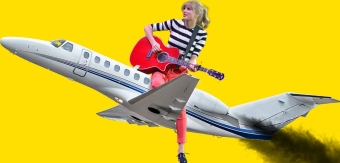Have you used your Tripod today? How about your Mobi? There's a very good chance you have, but you knew it as your iPhone. It seems the obvious name for Apple's mobile handset doesn't it? After all, they already the iPod and its companion iTunes software were already available - so when Apple created a phone, you'd imagine iPhone would have been the natural name. But in information just released, the fruity firm have admitted they were tempted by monikers like TelePad, Tri-Pod and Mobi, before arriving at the handle we know and love.
The process of naming a company, product or service can be very protracted. I was once tasked with branding a new line of catering bacon (it's all glamour in the copywriting game). The project lasted about ten days, and in that time I counted over 180 suggestions on my notepad. These resulted from at least five, drawn-out meetings and several telephone conversations with the client. For professional reasons it would be unfair of me to reveal the eventual selection, but it wasn't too far from 'Professional Catering Bacon'. That final choice wasn't on my list and had been 'invented' by the client. A lot of fuss, effort and money for a fairly dismal outcome. And I suspect this isn't an uncommon routine.
Clearly the name applied to any brand is quite important, but the process can be made unnecessarily complicated. The problem stems from clients (and agencies) endowing the job with too much importance. The fact is, once a brand gains sufficient traction and popular currency, it almost doesn't matter what it is called. Consumers rapidly become so used to using the syllables and words, they cease to have any meaning beyond being the name of that brand. Had any of us been asked, in 1886, to name a recently invented, 'health-giving' American soft drink, I wonder whether we'd have put Coca-Cola on the list. And, if we had, whether it would have made the first cut. After all, the 'cola' part is misspelt (it's from the kola nut, used in the original flavouring), it has a clumsy hyphen and does nothing to describe the product's selling points. Nevertheless, as you may have noticed, it has been pretty successful - even lending itself perfectly to the abbreviated 'Coke'.
Incidentally, unlike Coke, their arch rival did have something of a naming crisis. Pepsi Cola, for the first five years of its life, was called Brad's Drink. Easy to chuckle now, but if its makers hadn't switched to 'Pepsi' in 1889, none of us would bat an eyelid when asked whether we wanted Coke or Brad's.
Equally, it's hard to imagine using a search engine called 'Back Rub' - and yet if Google had stuck with their first choice, that's exactly what we'd be doing.
That said, once established, if a brand switches names the fallout can be substantial. Even now, it's not unusual to hear people of a certain age bemoaning the day Marathon bars became Snickers or Opal Fruits were rechristened Starburst. There are a couple of reasons for this. Whichever name a brand adopts at its outset, that is the name the consumer comes to know and trust. A total change disrupts the continuum and unsettles them. Secondly, the public can't understand why the new title has been adopted- appearing to be a pointless and slightly pretentious exercise. Although many re-brands are a prosaic activity - in many cases it is done in an effort to unify the name globally (most countries always called those peanut bars 'Snickers'), this is a commercial consideration which makes little sense to the shopper.
Of course, I'm not suggesting thought and consideration shouldn't be given to the naming of a brand. Calling a face cream 'Scrape' or a bathroom cleaner 'Scum' would be a perverse decision indeed. However, if you still haven't arrived at an adequate solution after many meetings, a clutch of focus groups and a shortlist of several options, it's fair to say you've missed the boat.
As Apple discovered, the obvious name may well be the best name.
Magnus Shaw is a copywriter, blogger and consultant






